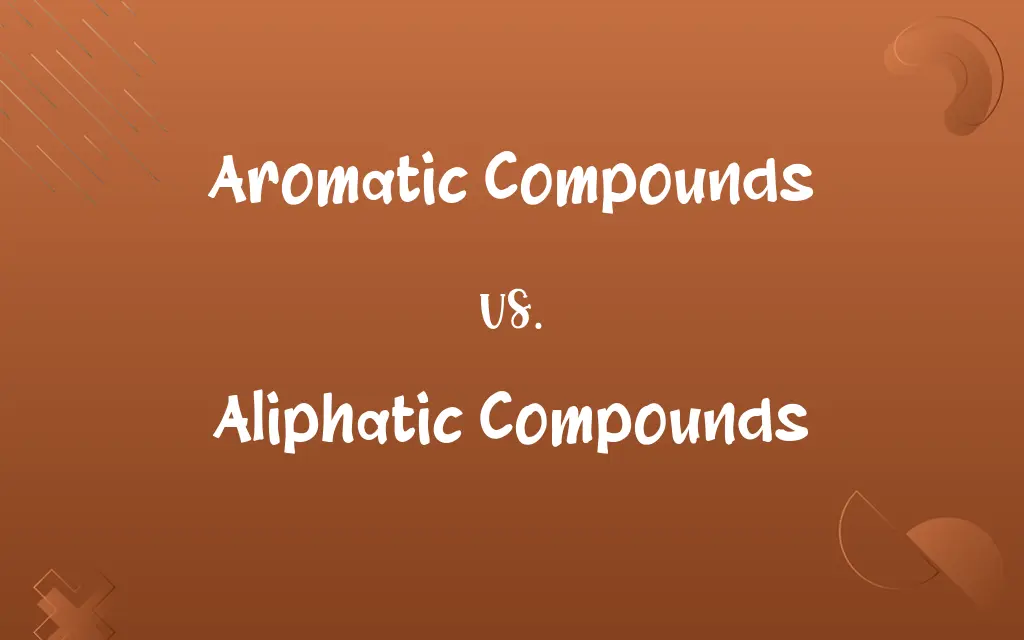Aromatic Compounds vs. Aliphatic Compounds: Know the Difference

By Shumaila Saeed || Updated on December 25, 2023
Aromatic compounds contain a ring of conjugated bonds with delocalized electrons, while aliphatic compounds consist of linear or branched structures without these rings.

Key Differences
Aromatic compounds have a ring structure with delocalized pi electrons, while aliphatic compounds are characterized by straight or branched chains without delocalized electrons.
Shumaila Saeed
Dec 17, 2023
Aromatic compounds are generally more stable due to resonance, whereas aliphatic compounds vary in stability depending on saturation.
Shumaila Saeed
Dec 17, 2023
Aromatics typically undergo electrophilic substitution reactions, while aliphatics are prone to addition reactions.
Shumaila Saeed
Dec 17, 2023
Aromatic compounds are common in natural substances like DNA bases, whereas aliphatic compounds are found in fats and oils.
Shumaila Saeed
Dec 17, 2023
Aromatic compounds often have distinct smells and higher boiling points, compared to aliphatics which can be gases, liquids, or solids with varying odors.
Shumaila Saeed
Dec 17, 2023
ADVERTISEMENT
Comparison Chart
Structure
Ring structure with conjugated bonds
Linear or branched without conjugated bonds
Shumaila Saeed
Dec 17, 2023
Chemical Stability
Generally more stable due to resonance
Varies, less stable without resonance
Shumaila Saeed
Dec 17, 2023
Occurrence in Nature
Common in DNA, fragrant plants
Found in fats, oils, waxes
Shumaila Saeed
Dec 17, 2023
Physical Properties
Distinct smells, higher boiling points
Range from gases to liquids and solids
Shumaila Saeed
Dec 17, 2023
ADVERTISEMENT
Aromatic Compounds and Aliphatic Compounds Definitions
Aromatic Compounds
Compounds with a cyclic ring and delocalized electrons.
Benzene, a simple aromatic compound, is used in many chemical syntheses.
Shumaila Saeed
Dec 12, 2023
Aliphatic Compounds
Exist as gases, liquids, or solids.
Methane, a gaseous aliphatic compound, is a major component of natural gas.
Shumaila Saeed
Dec 12, 2023
Aromatic Compounds
Often associated with distinct smells.
Many aromatic compounds contribute to the scent of flowers.
Shumaila Saeed
Dec 12, 2023
Aliphatic Compounds
Prone to addition reactions.
Aliphatic compounds like ethylene can readily undergo addition reactions.
Shumaila Saeed
Dec 12, 2023
Aromatic Compounds
Common in many drugs.
Many pharmaceuticals contain aromatic rings for their biological activity.
Shumaila Saeed
Dec 12, 2023
ADVERTISEMENT
Aliphatic Compounds
Compounds with linear or branched structures.
Propane, an aliphatic compound, is used as fuel.
Shumaila Saeed
Dec 12, 2023
Aromatic Compounds
Exhibits stability due to resonance.
Naphthalene, an aromatic compound, is stable and used in mothballs.
Shumaila Saeed
Dec 12, 2023
Aliphatic Compounds
Can be saturated or unsaturated.
Ethene, an unsaturated aliphatic compound, is used in plastic production.
Shumaila Saeed
Dec 12, 2023
Aromatic Compounds
Found in the bases of DNA.
Adenine and guanine are aromatic compounds in DNA.
Shumaila Saeed
Dec 12, 2023
Aliphatic Compounds
Predominant in fats and oils.
Stearic acid, an aliphatic compound, is found in many fats.
Shumaila Saeed
Dec 12, 2023
Repeatedly Asked Queries
What is an aliphatic compound?
Aliphatic compounds are organic molecules without a ring structure, usually linear or branched.
Shumaila Saeed
Dec 17, 2023
Why are aromatic compounds more stable?
Their stability comes from resonance within the ring structure.
Shumaila Saeed
Dec 17, 2023
Are all aromatic compounds fragrant?
Many are, but not all aromatic compounds have a noticeable smell.
Shumaila Saeed
Dec 17, 2023
How does the structure of aromatics affect their properties?
The ring structure with delocalized electrons gives them unique chemical and physical properties.
Shumaila Saeed
Dec 17, 2023
Are aromatic compounds found in nature?
Yes, they are common in natural substances like DNA and essential oils.
Shumaila Saeed
Dec 17, 2023
Do aliphatic compounds have high boiling points?
It varies, but generally, they have lower boiling points compared to aromatics.
Shumaila Saeed
Dec 17, 2023
What is a common use of aliphatic compounds?
They are widely used in fuels, lubricants, and as chemical feedstock.
Shumaila Saeed
Dec 17, 2023
What defines an aromatic compound?
Aromatic compounds have a ring structure with delocalized electrons.
Shumaila Saeed
Dec 17, 2023
Can aliphatic compounds be cyclic?
Yes, but without delocalized electrons, unlike aromatics.
Shumaila Saeed
Dec 17, 2023
Are aliphatic compounds soluble in water?
Many are not, due to their non-polar nature.
Shumaila Saeed
Dec 17, 2023
Do aromatic compounds play a role in medicine?
Yes, many pharmaceuticals contain aromatic rings.
Shumaila Saeed
Dec 17, 2023
Is benzene an example of an aromatic compound?
Yes, benzene is a classic example of an aromatic compound.
Shumaila Saeed
Dec 17, 2023
Is methane an aliphatic compound?
Yes, methane is a simple aliphatic compound.
Shumaila Saeed
Dec 17, 2023
How do aromatics react in chemical reactions?
They typically undergo electrophilic substitution reactions.
Shumaila Saeed
Dec 17, 2023
What type of reactions are aliphatics known for?
Aliphatic compounds often undergo addition reactions, especially unsaturated ones.
Shumaila Saeed
Dec 17, 2023
Can aliphatic compounds be polymers?
Yes, many polymers like polyethylene are based on aliphatic structures.
Shumaila Saeed
Dec 17, 2023
How are aliphatic compounds extracted?
They are often derived from natural gas and petroleum.
Shumaila Saeed
Dec 17, 2023
What are the environmental impacts of aromatics?
Some aromatic compounds, like benzene, are pollutants and harmful to health.
Shumaila Saeed
Dec 17, 2023
What is the significance of aromatics in perfumery?
Aromatics contribute significantly to the fragrance of perfumes.
Shumaila Saeed
Dec 17, 2023
Are aromatic compounds reactive?
They can be less reactive than aliphatics due to their stable ring structure.
Shumaila Saeed
Dec 17, 2023
Share this page
Link for your blog / website
HTML
Link to share via messenger
About Author
Written by
Shumaila SaeedShumaila Saeed, an expert content creator with 6 years of experience, specializes in distilling complex topics into easily digestible comparisons, shining a light on the nuances that both inform and educate readers with clarity and accuracy.









































































